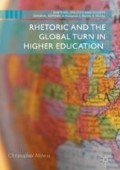Abstract
This chapter concludes by calling on rhetorical scholars and educators to pursue two key collaborative projects—a project of institutional research and critique that draws on their collective rhetorical knowledge and resources to critically interrogate the questions and motives of global higher education, and a project of curricular research that examines the role rhetoric, communication, and composing play in courses on global issues that are taught across the curriculum. The chapter calls for these collaborative projects as a local means toward making room for rhetorical education in the rapidly globalizing curriculum of US colleges and universities.
Access this chapter
Tax calculation will be finalised at checkout
Purchases are for personal use only
Notes
- 1.
For example, the mission of the University of Arizona’s Aerospace/Defense/Homeland Security Program is described on the program’s website as follows: “At the UA, our scientists are dedicated to protecting the United States. Research endeavors that focus on homeland security, defense, and aerospace permeate all corners of the institution, ensuring that we meet the strategic needs of our country.”
- 2.
See also David Harvey’s Cosmopolitanism and the Geographies of Freedom for a discussion of disciplinarity, politics, and colonialism.
Bibliography
Adler-Kassner, Linda. 2008. The Activist WPA: Changing Stories About Writing and Writers. Logan, UT: Utah State University Press.
American Council on Education. 2003. Internationalizing the Campus: A User’s Guide. Prepared by Madeleine F. Green and Christa Olson. Washington, DC: American Council on Education Center for Institutional and International Initiatives. American Council on Education.
Appadurai, Arjun. 2013. “The Future as Cultural Fact.” In The Future as Cultural Fact: Essays on the Global Condition, 285–300. New York: Verso.
Dannels, Deanna P., and Amy L. Housley Gaffney. 2009.“Communication Across the Curriculum and in the Disciplines: A Call for Cross-curricular Advocacy.” Communication Education 58, no. 1: 124–153.
de Oliveira Andreotti, Vanessa, Lynn Mario, and T.M. de Souza. 2012. “Introduction: (Towards) Global Citizenship Education ‘Otherwise’.” In Postcolonial Perspectives on Global Citizenship Education, edited by de Oliveira Andreotti, Vanessa, Lynn Mario, and T.M. de Souza. New York: Routledge.
Fleming, David. 1998. “Rhetoric as a Course of Study.” College English. 61, no. 2. (November): 169–191.
Fleury, Anthony. 2005. “Liberal Education and Communication Against the Disciplines.” Communication Education. 54, no. 1. (January): 72–79.
Harvey, David. 2009. Cosmopolitanism and the Geographies of Freedom. New York: Columbia University Press.
Hauser, Gerard. 1999. Vernacular Voices: The Rhetoric of Publics and Public Spheres. Columbia, SC: University of South Carolina Press.
Hesse, Doug. 2005. “2005 CCCC Chair’s Address: Who Owns Writing?” College Composition and Communication. 57, no. 2. (December): 335–357.
Morello, John T. 2000. “Comparing Speaking Across the Curriculum and Writing Across the Curriculum Programs.” Communication Education 49, no. 1: 99–113.
Mountford, Roxanne. 2011. “A Century After the Divorce: Challenges to a Rapprochement Between Speech Communication and English.” In The Sage Handbook of Rhetorical Studies, edited by Andrea A. Lunsford, Kirt H. Wilson, and Rosa Eberly. https://doi.org/10.4135/9781412982795.
Petraglia, Joseph. 2003. “Identity Crisis: Rhetoric as an Epistemic and a Pedagogic Discipline.” In The Realms of Rhetoric: The Prospects for Rhetoric Education, edited by Joseph Petraglia and Deepika Bahri, 151–70. Albany, NY: SUNY Press.
Porter, James E., Patricia Sullivan, Stuart Blythe, Jeffrey T. Grabill, and Libby Miles. 2000. “Institutional Critique: A Rhetorical Methodology for Change.” College Composition and Communication. 51, no. 4: 610–642.
Rood, Craig. 2016. “The Gap Between Rhetorical Education and Civic Discourse.” Review of Communication. 16, no. 2–3: 135–150.
Salisbury, Mark H., Paul D. Umbach, Michael B. Paulsen, and Ernest T. Pascarella. 2009. “Going Global: Understanding the Choice Process of the Intent to Study Abroad.” Research in Higher Education. 50: 119–143.
Soliday, Mary. 2011. Everyday Genres: Writing Assignments Across Disciplines. Carbondale, IL: Southern Illinois University Press.
Syverson, Margaret. 1999. The Wealth of Reality: An Ecology of Composition. Carbondale, IL: Southern Illinois University Press.
The University of Arizona. 2017. “Aerospace/Defense/Homeland Security.” The University of Arizona. Accessed August 25, 2017. http://www.arizona.edu/information/corporations-businesses/aerospace-defense-homeland-security.
Author information
Authors and Affiliations
Rights and permissions
Copyright information
© 2018 The Author(s)
About this chapter
Cite this chapter
Minnix, C. (2018). Conclusion: Rhetorical Education and the Local Production of Global Higher Education. In: Rhetoric and the Global Turn in Higher Education. Rhetoric, Politics and Society. Palgrave Macmillan, Cham. https://doi.org/10.1007/978-3-319-71725-8_6
Download citation
DOI: https://doi.org/10.1007/978-3-319-71725-8_6
Published:
Publisher Name: Palgrave Macmillan, Cham
Print ISBN: 978-3-319-71724-1
Online ISBN: 978-3-319-71725-8
eBook Packages: Political Science and International StudiesPolitical Science and International Studies (R0)

